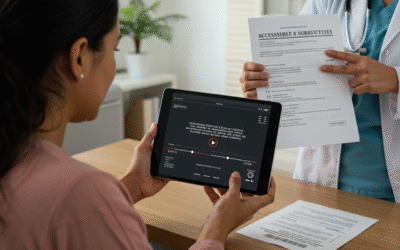2023 marked a milestone in the evolution of artificial intelligence applied to translation and localization. This year, automatic translation (AT) and natural language processing (NLP), driven by deep learning and neural translation, reached an unprecedented level of sophistication. AI systems, capable of handling contexts and cultural nuances accurately, have been key to effective and respectful localization.
One of the outstanding achievements was the improvement in the quality of neural machine translation, with levels of accuracy comparable to human translators in various languages and contexts. In the voice-over sector, AI enabled the creation of highly realistic synthetic voices adapted to different languages and dialects, enhancing linguistic accessibility and opening new possibilities in the localization of audiovisual content.
Furthermore, the deeper integration of AI in localization tools has improved the ability to adapt products and services to specific cultural contexts. However, the year also presented significant challenges concerning data privacy, security, and AI ethics, including bias and the fair representation of all languages and cultures.
Continuing from this point, the role of the human element in AI-assisted translation processes became a focal point in 2023. Companies like SumaLatam, through a year rich in experiences and learnings, confirmed the indispensable nature of human intervention to ensure the expected quality in each translation task. Far from seeing human roles threatened by AI, SumaLatam adopted a transformative approach, valuing the synergy between human experience and advancements in generative AI technology.
The integration of AI has brought efficiency and speed to the translation and localization process, but nuanced understanding and cultural sensitivity for high-quality work often require a human touch. Professional translators are irreplaceable in interpreting context and ensuring cultural appropriateness. SumaLatam highlighted that the evolution of its workforce is not about replacing humans with AI but redefining and enhancing the role of human translators.
SumaLatam’s approach illuminated a path for the translation industry, where AI is a collaborator that enhances human capabilities. This fosters an environment of continuous learning and adaptation, where translators expand their skills to collaborate effectively with AI technologies.
The experiences of 2023 established the ongoing relevance of the human element in AI-assisted translation. The future of translation and localization lies in leveraging the strengths of both human experience and AI to achieve superior results. As AI technology evolves, so too will the role of human translators, continuously adapting and growing in this dynamic landscape.
Artificial Intelligence, Automatic Translation, Localization, Voice Over, Natural Language Processing, Deep Learning, Cultural Adaptation, Neural Translation, Linguistic Accessibility, Emerging Technologies, Human Intervention.





